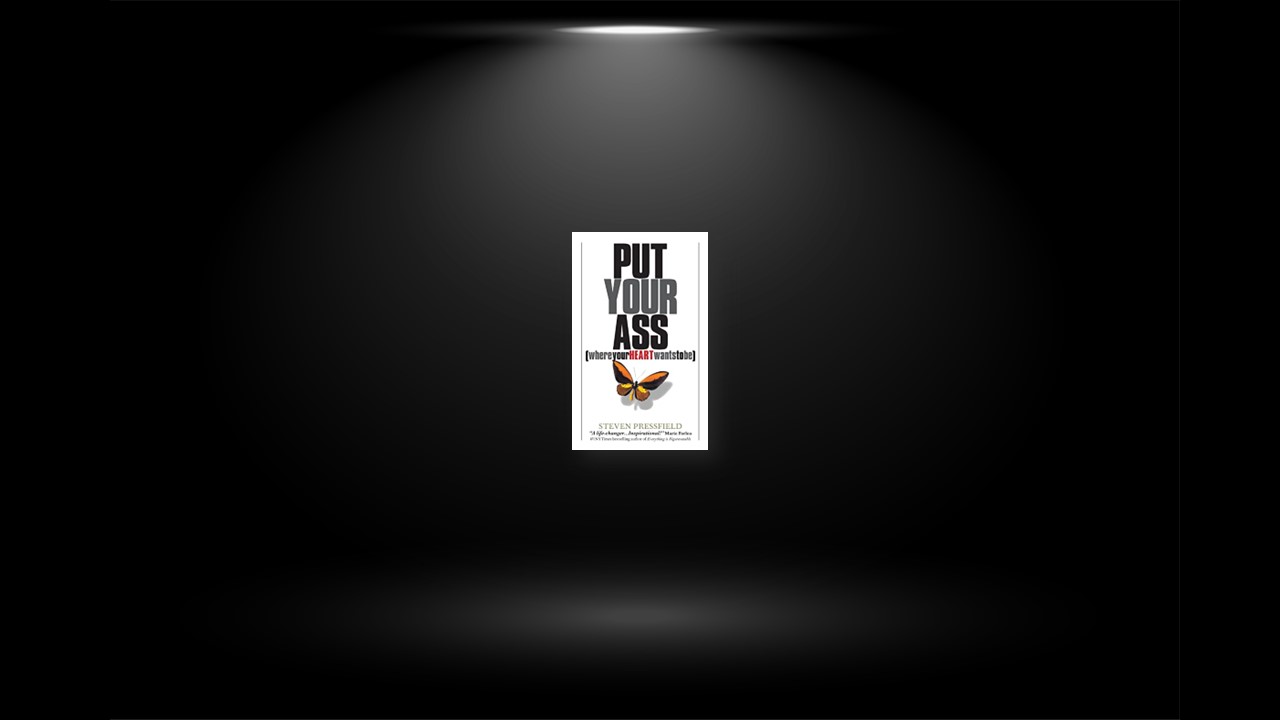PUT YOUR ASS WHERE YOUR HEART WANTS TO BE
interpretation, the word means body. Our physical presence. When we say, “Put your ass where your heart wants to be,” we mean station your physical body in the spot where your dream-work will and must happen.
Want to write? Sit down at the keyboard.
Wanna paint? Step up before the easel.
Dance? Get your butt into the rehearsal studio.
Dumb and obvious as it sounds, tremendous power lies in this simple physical action.
FEAR
What keeps us from writing or dancing or painting? If the process is as straightforward as we just described it, what’s the big hang-up? Why doesn’t everyone do it?
In one four-letter word: FEAR.
Yes, we’re terrified to begin our eight-hundred-page Elizabethan family saga. When we sit over our morning coffee thinking about it, our palms sweat. Our heart palpitates in dread.
Get up! Go to your office! Don’t stop to schmooze with your spouse or the dude in the next cubicle. Sit down! Open your file. Place your fingers on the keyboard.
Tremendous power lies in the simple, physical act of stationing our body at the epicenter of our dream.
There is magic in putting our ass where our heart wants to be.
THERE IS NOT HERE
Hemingway moved to Paris. Arnold Schwarzenegger left Austria for Gold’s Gym in Venice, California. Bob Dylan moved to Greenwich Village. Joni Mitchell left Saskatoon for Laurel Canyon.
Why did they move? First: resources. In ’68 there were no gyms like Gold’s anywhere. If you wanted to be the best, like Arnold, you had to go where the resources were.
Want to make a feature film? Go where the cameras are.
Wanna be a ballet dancer? Yes, you can find good classes in Bozeman or Bogalusa.
GURUS AND MASTERS
We’ve been speaking of “put your ass” in the sense of “move to a specific scene or metropolis.” But there are other, more occult, applications of this principle.
Certain arts and skills may be learned only from a few masters—maybe as few as three or four in the whole world—whose academies or dojos may be located in the most remote places on Earth. To study Theravada Buddhism, you may have to travel to Katmandu. To study Zen via the art of archery, the young German philosopher Eugen Herrigel had to seek out master Awa Kenzo in Japan.
Big-wave surfing? There’s Laird Hamilton and very few others. Show jumping or dressage? You may need to pack up for Germany to work with Klaus Balkenhol or Ernst Hoyos.
HOW DOES SUCCESS (REALLY) HAPPEN?
Here’s director Ernie Pintoff, advising to plunge into the pool with no mental reservations.
“Keep working,” Ernie said. “Don’t turn anything down. Porn flicks, slasher movies, free stuff for friends. Don’t get precious. You’re young. You’re learning. Keep working.”
Ernie cited three reasons:
“One, working means you’re getting paid. Every buck means you’re a working pro. You’re toiling in your chosen field.
“Two, when you work, you learn. Everybody has something to teach you. A grip will show you something about lighting, an editor will drop some pearl about what to keep and what to cut. Even actors know something.
“Three, you’re making friends. Some kid who’s schlepping coffee today may be a producer tomorrow. An actress you do some free work for today may get you hired for a rewrite six months from now.”
This is how any career really works—dance, theater, photography, financial planning. Even the military works like this.
A LIFETIME, ONE HOUR AT A TIME
Can we put our ass where our heart wants to be if we’ve got a family, a job, a mortgage?
Yes.
The Muse does not count hours. She counts commitment. It is possible to be one hundred percent committed ten percent of the time. The goddess understands.
James Patterson was creative director of J. Walter Thompson, the mega-ad agency of the fifties and sixties. His dream was to be a writer of fiction. He would come into the office every morning at six. He’d close his door and lock it. For two hours, he wrote fiction. When the advertising day started, he opened his door and became a regulation Mad Man.
As of 2022, James Patterson’s books have sold three hundred million copies.
One hour a day is seven hours a week, thirty hours a month, 365 hours a year. Three hundred and sixty hours is nine forty-hour weeks.
Nine forty-hour weeks is a novel. It’s two screenplays, maybe three.
In ten years, that’s ten novels or twenty movie scripts.
You can be a full-time writer, one hour a day.
PUT YOUR ASS ALL THE WAY TO THE FINISH LINE
From Ryan Holiday’s Perennial Seller:
You can cut back on a lot of things as a leader, but the last thing you can ever skimp on is marketing. Your product needs a champion . . . That must be you. Marketing is your job. It can’t be passed on to someone else. Even if you’re famous, even if you have a million Twitter followers, even if you have a billion dollars to spend . . . it’s still on you and it still won’t be easy.
Putting your ass where your heart wants to be means putting it out there where the world can judge it—and doing it in the smartest and most appealing way possible.
SHIP IT
Don’t miss deadlines.
The benefit is that once we agree to the deadline, we don’t have to worry about it anymore. We don’t have to negotiate, come up with excuses or even stress about it.
It won’t ship when it’s perfect.
It will ship because we said it would.
Once this is clear, the quality of what we ship goes way up. Instead of spending time and energy looking for reasons, excuses or deniability, we simply do the work.
And over time, we get better at figuring out which deadlines to promise. Because if we promise, we ship.
WHAT CHANGES WHEN WE PUT OUR ASS WHERE OUR HEART WANTS TO BE
We look at ourselves and the world differently once we’ve relocated the center of our being from the ego to the Self.
Yes, we still pay taxes and still participate in politics and still concern ourselves with our children’s futures. We have to because we do inhabit the Material Dimension and these concerns are legitimate and honorable and necessary.
But simultaneously we inhabit a different Reality, a reality in which we are at once more aware of our individual gift (and of our obligation to realize it) and of the gifts of an infinitude of others (and our obligation to assist them in realizing their own worth and power).
We become conscious of our own gift. We no longer doubt this or dismiss it or despise it. Instead, we resolve to serve it. We may still fear personal extinction. We may still worry about our children’s futures and the health of our community and nation and planet. But we come at these concerns from a different place and with a different sense of what kind of difference we can make and how and why, or even if we wish to attempt to make a difference at all.
We have become artists, not in the precious sense of differentiating ourselves from others in some imagined superior way, but in the sense of being servants of an intention that comes from somewhere else, even though we cannot grasp what that intention is or what its source may be. We trust this intention somehow, even though we can’t say why.


